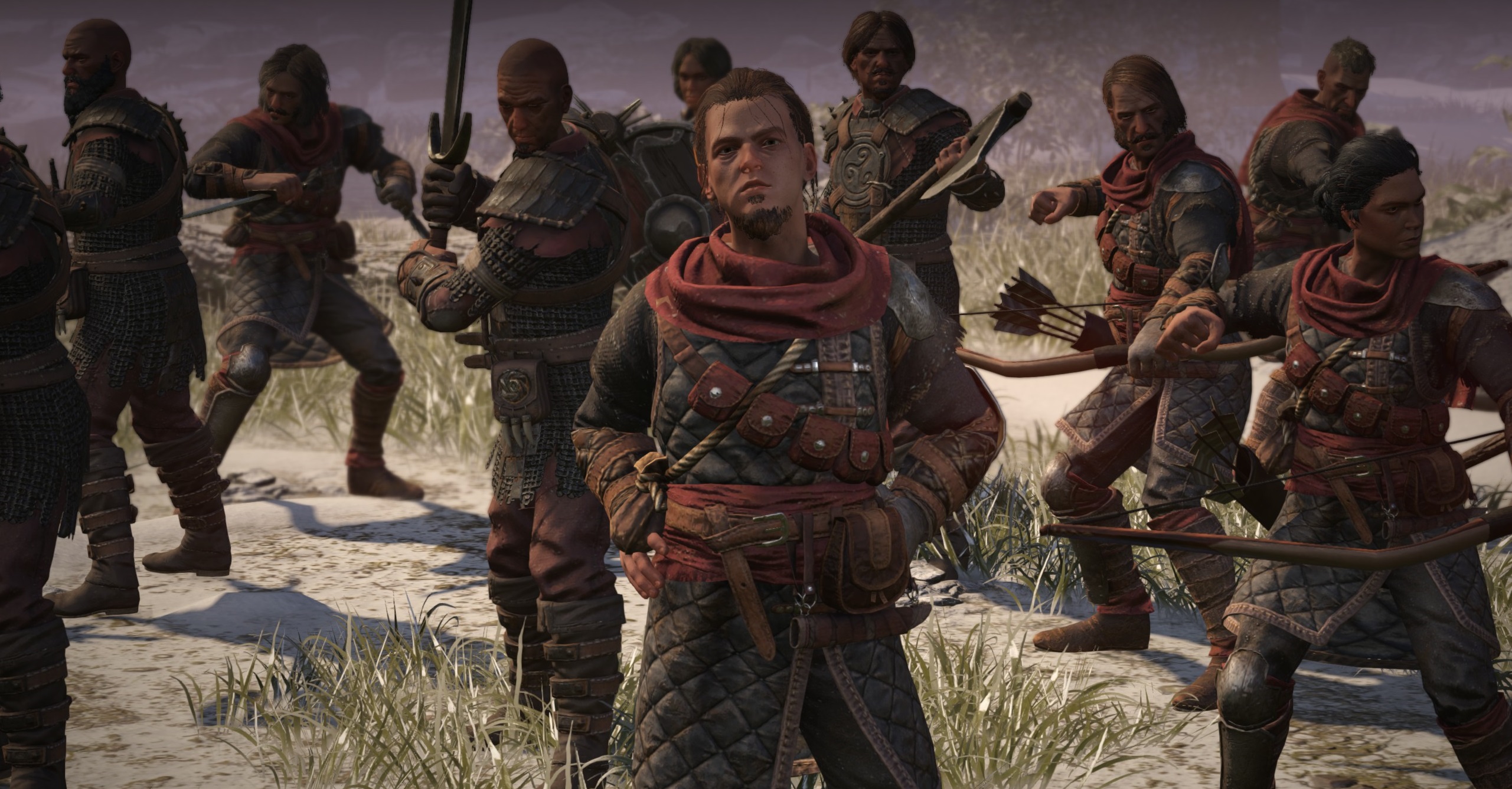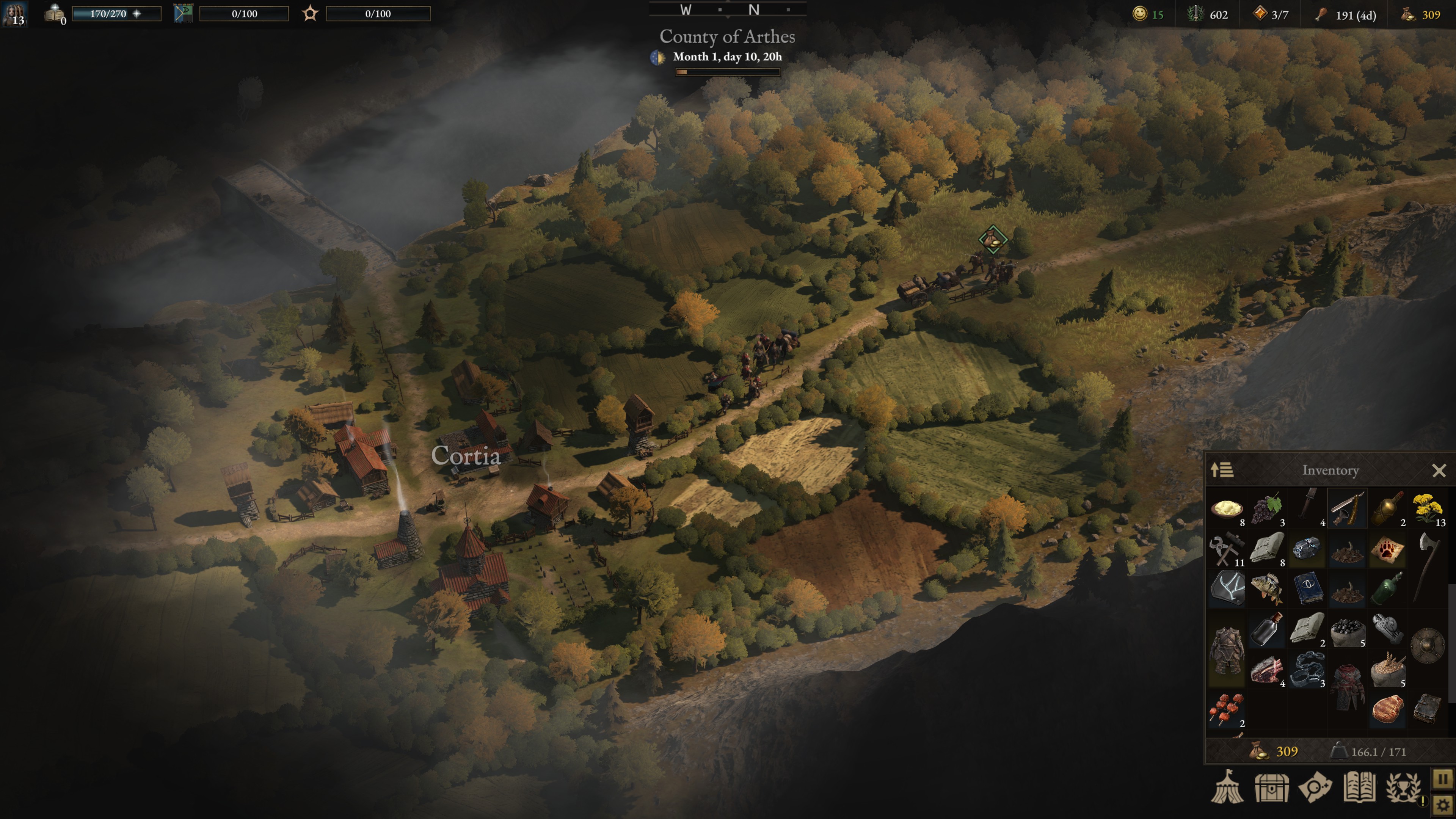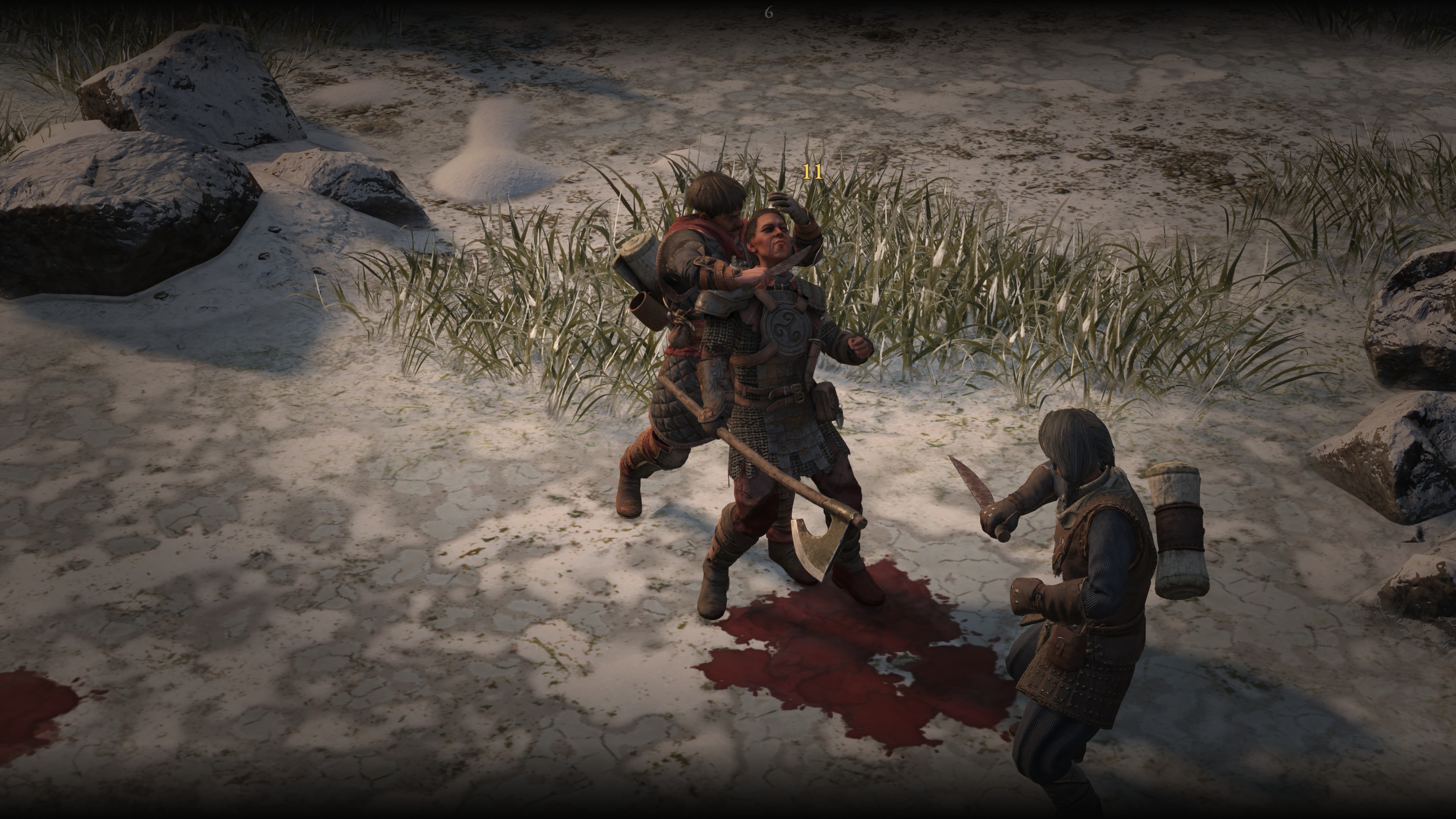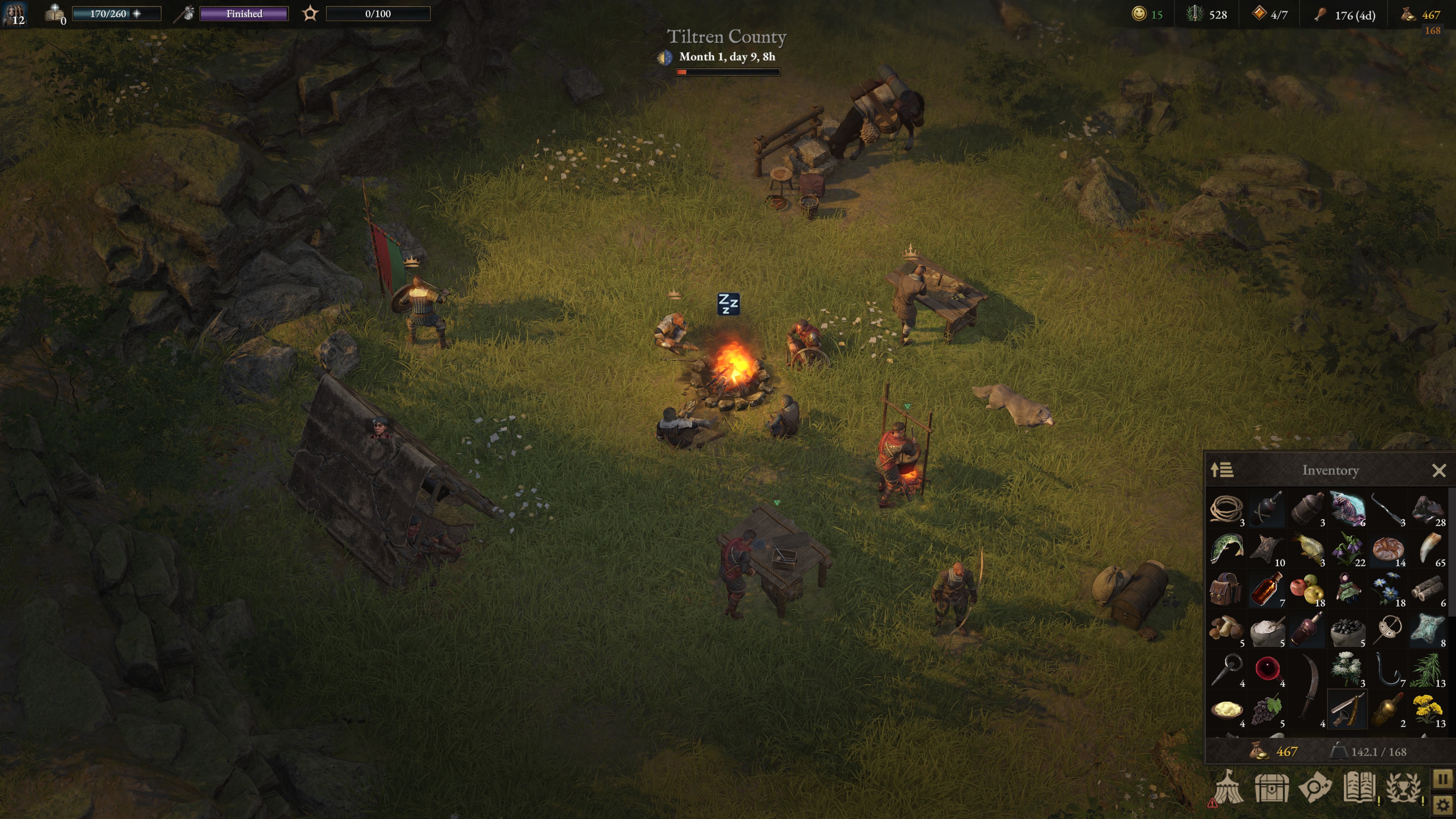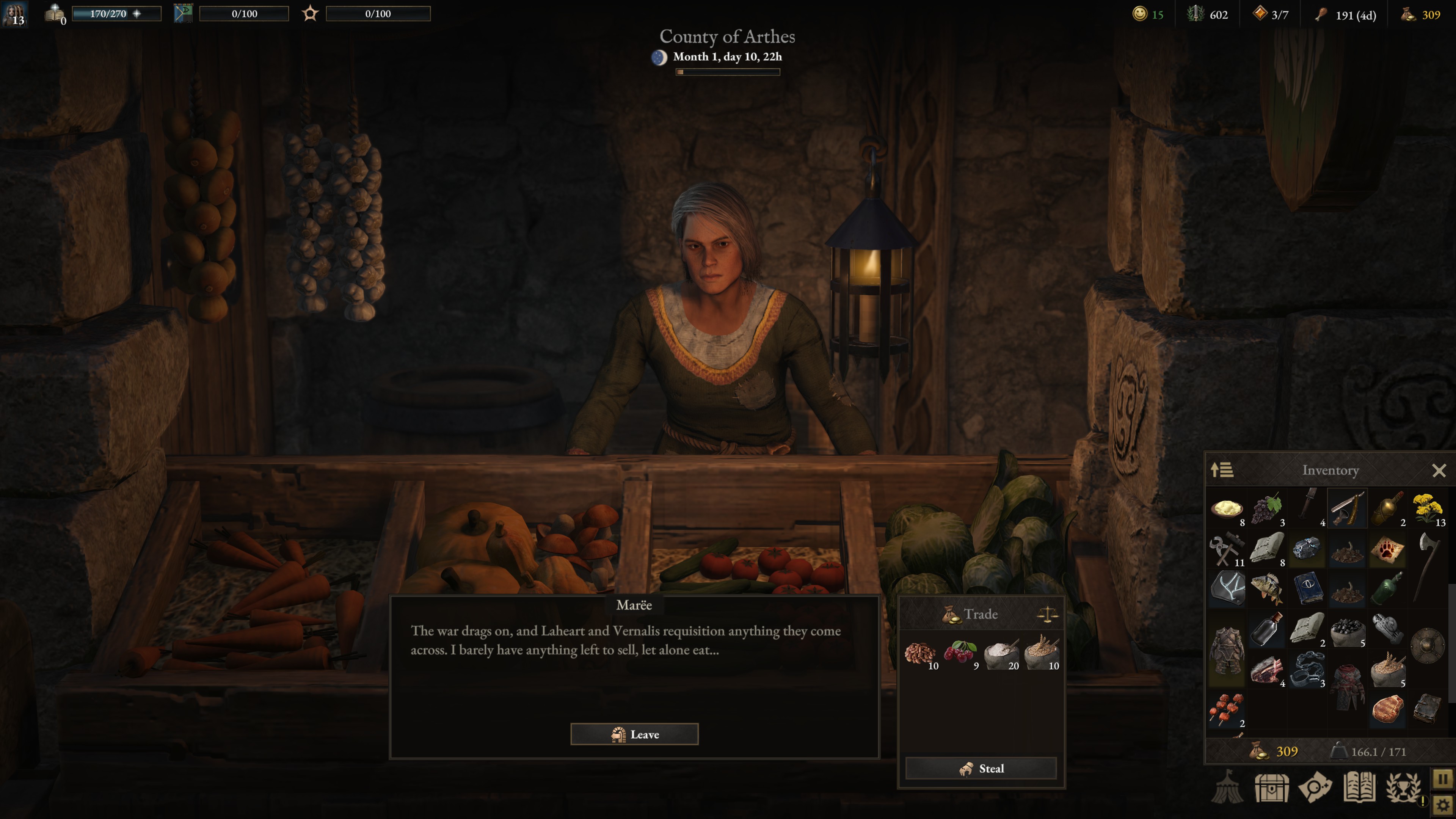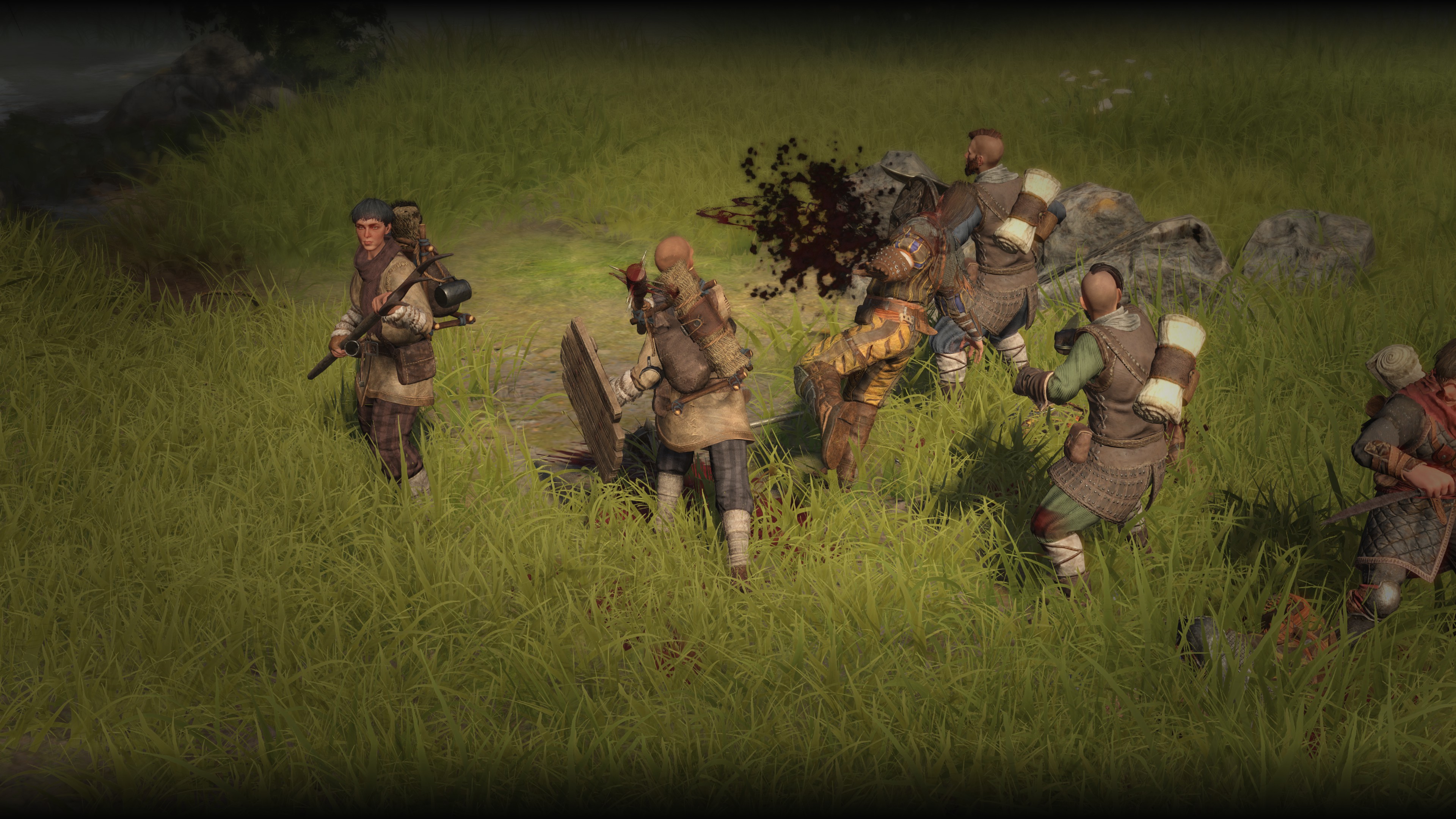Our Verdict
Don't be fooled by its drab exterior, Wartales is a deep and richly rewarding exercise in party creation.
PC Gamer's got your back
What is it? A granular player-driven RPG with tactical turn-based combat
Release date: April 12, 2023
Expect to pay: £30/$35
Developer: Shiro Games
Publisher: Shiro Unlimited
Reviewed on: AMD Ryzen 5 3600, Nvidia GeForce 2080 Super, 32GB RAM
Steam Deck: Playable
Link: Official site
Like a battle-hardened mercenary roped into another foolish adventure, Wartales hides its colourful inner life behind a grim, inscrutable visage. This player-driven RPG presents with a muted aesthetic, lacks a typical central storyline, and isn't defined by any single feature. It's a game that rebuffs your initial advances with a grunt, because it knows you'll be feeding the crows before the week's out.
Survive long enough to penetrate that tough exterior, however, and you'll discover a game built from a thousand little ideas. These ideas accrue over time into a journey that feels unique to you. It isn't as strange as Kenshi or as spectacular as Mount & Blade, but it makes up for that in how personally attached you become to the party you create.
Wartales puts you in charge of a newly formed mercenary band in a low-fantasy realm ravaged by conflict. Your goal is simply to look after the band's interests, growing your troupe in power and prestige by exploiting the realm's turmoil to your advantage. How you do this is largely up to you. You choose where to go, who to recruit, how to make money, and where to camp at night.
Daily bled
In fact, the decision-making process starts before the game kicks off, as Wartales lets you play in several ways. The game has two separate difficulty settings for its turn-based combat and its survival simulation, and it lets you decide how often you want to save your progress. The choice that will most define your experience, however, is whether to play with level-scaling, where the game tries to match its challenge with your capabilities, or keep levels region-locked, increasing the difficulty as you push toward the edges of the world.
In my opinion, region-locked is the way to go, as it provides a clearer sense of where you are along the power curve, and encourages you to explore every region you visit. Whichever way you tailor your experience, Wartales still operates on the same two layers. The highest layer is a Mount & Blade-style overworld where you travel between locations, visiting villages, farmsteads, ruined fortifications and many other landmarks. Your journey across the map is constrained by a stamina meter. When it runs out, you'll need to rest, else your companions will start keeling over from exhaustion.
If you so choose, you can just collapse around the campfire and wait until your stamina meter refills. But your companions won't be too pleased by this. They expect to be fed at every stop, and payment for their services every three stops. The more companions you have in camp, the more food and money you'll need to divvy out at these intervals.
Inevitably, your chosen path will lead to a fight.
In short, cakes and coin are the two key resources you need to keep your adventure rolling along. How you acquire these is down to you. The most straightforward approach is to head to the nearest inn and nab a few contracts from the bounty board. These pay a handful of coins for grunt work like killing local bandits or conveying messages to other villages. Alternatively, you could go hunting for animals in Wartales' many forests, keeping the meat to eat and selling the pelts for cash. Or you could commit to a life of crime, stealing food from under the noses of market vendors, and robbing other travellers that wander around the map.
Keep up to date with the most important stories and the best deals, as picked by the PC Gamer team.
Although your route through the world is open ended, certain experiences are universal. Inevitably, your chosen path will lead to a fight. When blades are drawn in Wartales, the game switches to a turn-based battle map. Like the game as a whole, combat seems unremarkable at first, but reveals itself to be impressively open ended. Before a battle starts, you're allowed to position your troops around the battlefield, pick which unit attacks first, then use the rest in any order you like. You can also deploy movement points, basic attacks, and special abilities in any combination, and continue to mix and match until they all run out.
This flexibility extends to how your units fight. A character's combat style is influenced by a wide range of factors such as their base class, the skills they've unlocked, even the specific weapon they're equipped with. You can even choose how your units regain Valour points used to deploy special abilities. They might regain these by killing an enemy, by engaging with an enemy (i.e locking into a fight so they're unable to withdraw without risking damage) or by ending their turn standing next to a friendly or enemy unit.
Despite this flexibility, combat is rarely easy. Your units can only take a few hits before they risk death, and the team's Valour points are pooled, so you need to think hard about when to use them. A basic tactic is to engage an enemy with a unit that has good defensive skills, then use a high DPS unit to ambush them from behind, which deals bonus damage. But after a few hours' play my best ranger (and the group's captain) unlocked an ability to drop a smoke cloud, which gave any friendly units in the area a free attack on an opponent they were engaged with. For the next few hours, my primary tactic was to try to engage enemies in a clump, then use Heldt's smoke ability to slice an extra chunk of health off as many enemies as possible.
Moonlighters
As units become more proficient and new strategic avenues open up, your approach to combat will constantly evolve. But your mercenaries aren't solely defined by their fighting skills. Every character in your crew can choose a secondary profession that aids the camp in some way. Anglers, for example, can catch fish from set points around the map, increasing your food supply for free. Cooks, meanwhile, can take those fish and turn them into a more nourishing meal, stretching your rations further. Blacksmiths can forge new weapons and armour for your troops, while thieves can swipe goods from under merchant's noses, and pick locks on chests in abandoned ruins for extra loot.
Through this combination of combat class and character profession, your mercs will start to exhibit more specific personalities. My starting archer, named Ledric, was an absolute liability on the battlefield. Not only was he rarely involved in the fighting, but when he did his hands dirty, his arrows would often hit his companions rather than the enemy. On the other hand, he was also the camp's lead tinker, responsible for making basically everything that kept the camp running. This made it worth putting up with the occasional arrow in the arse.
You can capture and tame wild animals to fight alongside you, and each animal has its own skill tree.
As both your camp and your mercenaries grow, new opportunities unfold. You can capture and tame wild animals to fight alongside you, and each animal has its own skill tree. You can knock out and shackle enemies on the battlefield and exchange them at the nearest prison for a fee. Hidden around the world are elaborate tombs you can explore, using torches to push through the gloom for hidden treasures and strange artefacts that you'll need to recruit a scholar to decipher. And while there's no central storyline to pursue, each region has an optional story you can follow, which will ultimately shape the future of the people who live there.
I've spent a lot of this review explaining how Wartales works. But how it works is also why it's good. Shiro Games has created a rich and granular mechanical toybox, where every action you perform moves the needle slightly, resulting in either a reaction or a reward that gives you ideas about what to do next. The stories it tells aren't as generative as your Dwarf Fortresses or RimWorlds, but the way its rules work makes it easy for your imagination to fill in the narrative gaps. As you pootle around in your camp, your mercs will occasionally have moments of introspection leading to a minor narrative choice. In one example, Ledric resolved to be more social with the other mercs, presumably to improve his standing with them. His efforts did make him one friend in the camp. Unfortunately, it was the pony.
There are gaps in Wartales' well-worn chainmail. The game's structure necessitates a lot of backtracking, especially in the early stages. You'll frequently need to return to villages to hand in contracts, buy food and other equipment, or sell items to lighten your inventory. It's also possible to get bogged down in a loop of only earning enough money to cover your basic costs, making it hard to push farther out to new areas. While I wouldn't describe Wartales as a tedious game, there are times when it can move frustratingly slowly.
More broadly, compared to, say, Divinity, the world itself is not especially characterful. Once you've explored a couple of regions, the format according to which those regions are built pokes through, dampening some of the magic. And while the quests and dialogues are capably written, I'd struggle to tell you the names of any characters I interacted with outside of my own party.
That said, the mercs who you recruit, train, eat with, sleep with, explore with, and fight alongside will be burned into your brain forever. Wartales may not be the flashiest or most accessible game around, but persistence will enrich you with the most valuable currency any game can provide: memories.
Don't be fooled by its drab exterior, Wartales is a deep and richly rewarding exercise in party creation.
Rick has been fascinated by PC gaming since he was seven years old, when he used to sneak into his dad's home office for covert sessions of Doom. He grew up on a diet of similarly unsuitable games, with favourites including Quake, Thief, Half-Life and Deus Ex. Between 2013 and 2022, Rick was games editor of Custom PC magazine and associated website bit-tech.net. But he's always kept one foot in freelance games journalism, writing for publications like Edge, Eurogamer, the Guardian and, naturally, PC Gamer. While he'll play anything that can be controlled with a keyboard and mouse, he has a particular passion for first-person shooters and immersive sims.
